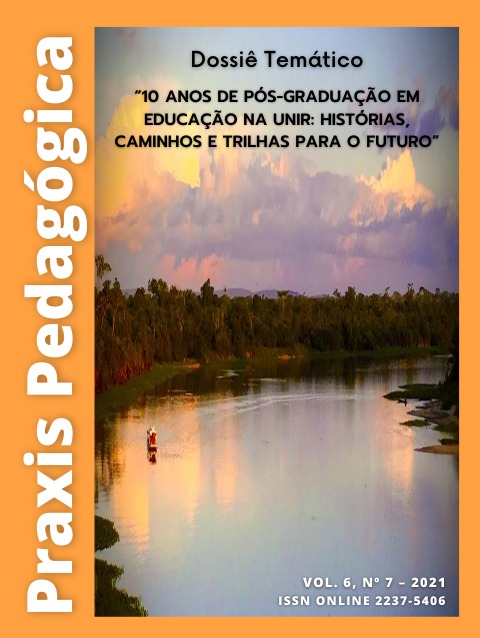CHILDHOOD EDUCATION
AN ARGUMENTATION ABOUT REMOT E CLASSES
DOI:
https://doi.org/10.69568/2237-5406.2021v6n7e6041Keywords:
cellular, child education, interaction, remote classesAbstract
The present article presents a research with the objective of verifying, under the perspective of the professional and parents of a room of the Infantile education, (pre I), of an Institution of the municipal network of the city of Matupá - MT. How are remote classes going? This work will be structured in line with the National Curriculum Reference for Early Childhood Education. Do the remote classes being developed by the interviewees (parents, teacher), notice a learning happening? We seek support from authors who continue this approach, which presupposes that human beings are not only a product of their social context, but are also an active agent in the creation of this context. The methodology used was qualitative research of an interpretative nature. During the text, we talked about new technologies, (cell phone) being discussed in the pedagogical practice of this stage, making it possible to verify, through the analysis of the data collected from the participants of this study, that, in the perception of these interviewees, an interaction occurred to develop learning.
Downloads
References
BEHAR, Patricia A. et al. A validação de objetos de aprendizagem para formação de professores de Educação Infantil. Disponível em:
<http://200.169.53.89/download/CD%20congressos/2008/V%20ESUD/trabs/t38679.pdf
>. Acesso em: 14 jan. 2011.
BRASIL. Lei de Diretrizes e Bases da Educação Nacional. Ministério da Educação. Brasília. Distrito Federal, 1996.
BRASIL. Base Nacional Comum Curricular. Brasília: MEC, 2017. Disponível em: http://basenacionalcomum.mec.gov.br/images/BNC C_20dez_site.pdf. Acesso em: 22 de dezembro de 2017.
______. Constituição Federal de 1988. Brasília. Distrito Federal, 1996
______. Referencial Curricular Nacional para a Educação Infantil. Ministério da Educação e do Desporto. Secretaria de Educação Fundamental. Brasília: DF, vol. 1. Introdução, 1998.
KENSKI, V. M. O papel do professor na sociedade. In: Ensinar a Ensinar. São Paulo, Pioneira, 2001.
______. Educação e tecnologias: O Novo Ritmo da Informação. Campinas: Papirus, 2007.
KRAMER, S. MOREIRA, A. F. M. Contemporaneidade, Educação e Tecnologia. In: Revista Educação e Sociedade: Educação Escolar: Os Desafios da Qualidade. Campinas, vol. 28, n. 100 – especial, p. 1037-1057, out. 2007. Disponível em: <http://www.scielo.br/pdf/es/v28n100/a1928100.pdf>. Acesso em: 23 jan. 2011.
MACHADO, N. J. Conhecimento e valor. Coleção Educação em pauta: teoria e tendências. São Paulo: Moderna, 2004.
MATO GROSSO. Documento de Referência Curricular para Mato Grosso, Concepções para a Educação Infantil, 2018.
OLIVEIRA, Z. M. R. Educação infantil: fundamentos e métodos. São Paulo: Cortez, 2011.
PRADO, M. E. B. B. Educação a distância via Internet. São Paulo: Avercamp, 2003. REGO, T. C. Vygotsky: uma perspectiva histórico-cultural da educação. 10. ed. Petrópolis: Vozes, 2000.
PIMENTA, Selma Garrido. O Pedagogo na Escola Pública. São Paulo: Loyola, 1991.
FREIRE, Paulo Pedagogia da Autonomia. Saberes necessários à prática educativa.São Paulo: Paz e Terra, 2001.
SANCHO, J. M. Para uma tecnologia educacional. Porto Alegre: Artmed, 1998.
SIMÕES, C. A.; SIMÕES, A. V.; SILVA-FORSBERG, M. C. A apropriação de
tecnologias de informação e Comunicação como estratégia pedagógica para o Ensino de ciências.Disponível em:<http://colombiadigital.net/newcd/index.php?option=com_docman&task=doc
_download&gid =1032&Itemid=>. Acesso em: 25 jan. 2011.
VERASZTO, E. V.; SILVA, D.; MIRANDA, N. A.; SIMON, F. O. Tecnologia:
Buscando uma definição para o conceito. Prisma.com, nº 7, 2008. Disponível em:
<http://prisma.cetac.up.pt/60_Tecnologia_Buscando_uma_definicao_para_o_c onceito_Estefa no_Veraszto_et_al.pdf>. Acesso em: 04 mar. 2011.
VYGOTSKY, L. S. A Formação Social da Mente. São Paulo: Livraria Martins Fontes Editora Ltda., 1998.
Downloads
Published
How to Cite
Issue
Section
License
Ao submeter um artigo à Revista Praxis Pedagógica e tê-lo aprovado, os autores concordam em ceder, sem remuneração, todos os direitos de primeira publicação e a permissão para que Praxis Pedagógica redistribua esse artigo e seus metadados aos serviços de indexação e referência que seus editores julguem apropriados.



